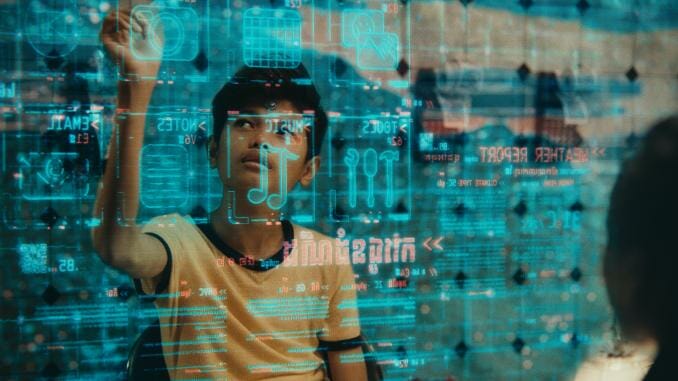Kid Detectives Navigate Beautiful Near-Future Cambodia in Karmalink

Karmalink is an earnest near-future sci-fi built around the thin line between memory and fantasy, with a plot centering on friendship, mystery and technological advancement. Set in Cambodia, Jake Wachtel’s directorial debut revolves around children living at the underdeveloped edge of a technologically advanced capital city. “Young detective” Srey Leak (Srey Leak Chhith) tries to untangle the connection between Leng Heng (Leng Heng Prak), her friend living in the Tralok Bek outskirts of Phnom Penh who sees his past lives in his dreams, and a neuroscientist (Sahajak Boonthanakit) trying to attain enlightenment through technology. The film never needlessly complicates things, moving quickly to establish its stakes, yet still provides moments of surprise.
Unsurprisingly, Karmalink is about karma and reincarnation: It opens with a man hooking himself up to a machine, praying, “I am born of my karma, heir to my karma.” The screen fades to show a thief (Ros Mony) stealing a golden Buddha statuette and burying it in a field after being confronted by a monk (Chear Sreng). Leng Heng awakens from this dream, eventually seeking the treasure he believes he stole, hid and discovered over multiple past lives. Meanwhile, his mother (Sveng Socheata) is leading protests—developers of a high-speed rail to China threaten to buy and raze the community. His grandmother (Savern Oum) is part of a memory study being conducted by Dr. Sophia (Cindy Sirinya Bishop). Elsewhere in their community, the resourceful Srey Leak survives with insufficient help from her older brother Kosal (So Sokvan), scavenging and bartering between junk dealers and selling cigarettes at night clubs. Leng Heng and his friends—Ty (Li Ty), Mi (Tommy Henderson) and Do (Rando Henderson)—hire Srey Leak to help them find the treasure.
This film about friendship and love sees poverty create the goal and poverty create the obstacles. Srey Leak Chhith and the late Leng Heng Prak ground the youthful adventure in their relationship as their trust in and dependence on one another carries the story from the precarious circumstances of their lives and the lofty dreams produced from their drive to escape them. The mystery at the heart of their adventure—Where can we find that golden Buddha?—and the dream-recording AUGR technology they encounter allows the story to casually engage with memory and reincarnation. This leads to pursuits of insight, self-discovery and, eventually, enlightenment through technology, all of which reveal moral quandaries about life and consciousness.
But that philosophical depth isn’t so much a concern of the children as something that appears late into their journey. More surprisingly, the economic pressure doesn’t create as much familial tension as one might expect. In some ways, the film feels like a vivid dream, as an emotional arc bound in near-dire economic circumstances is met by community resilience that doesn’t feel inevitable but isn’t built in struggle. On the other hand, during a holiday ceremony, the words of a religious leader (about how everything will turn out alright) feel intentionally shallow as the family nears eviction and the community is apparently on its heels.
-

-

-

-

-

-

-

-

-

-

-

-

-

-

-

-

-

-

-

-

-

-

-

-

-

-

-

-

-

-

-

-

-

-

-

-

-

-

-

-








































